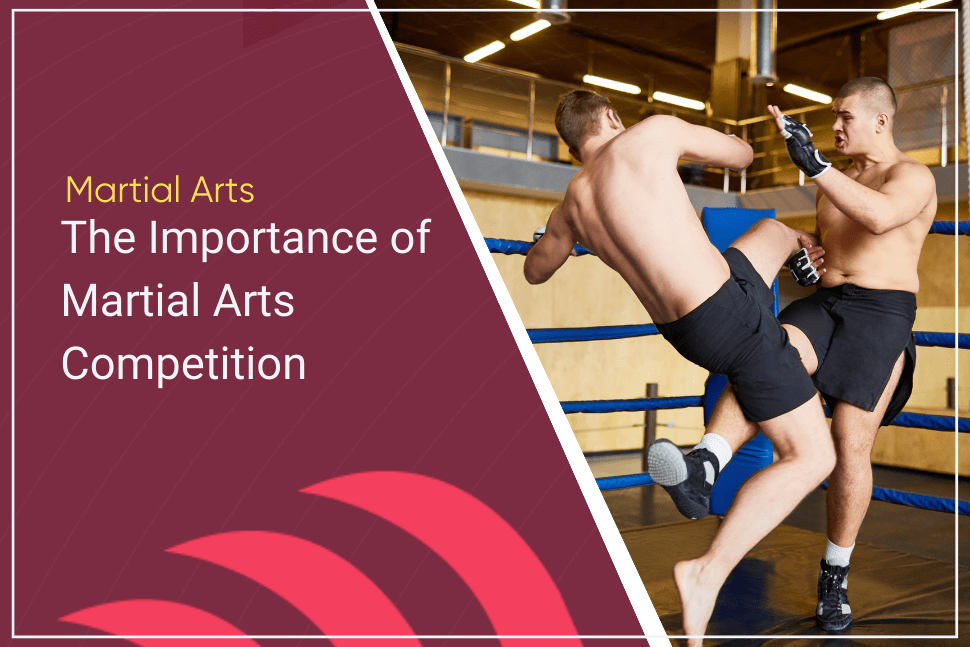“The true science of martial arts means practicing them in such a way that they will be useful at any time, and to teach them in such a way that they will be useful in all things.”
– Miyamoto Musashi
Competing in a martial arts event like mixed martial arts (MMA), jiu jitsu, boxing, and many others is sometimes overwhelming to those who have never trained or are just getting started. That is understandable given the risk of serious injury.
The thought becomes less scary once you start training and begin to grow your body and mind and realize that there are many benefits associated not just with training, but in competing on an amateur and professional level.
As a former professional competitor, I have benefited and developed as a person in so many positive ways that I never would have otherwise. Martial arts has made me a better person and given me a safe outlet that helps maintain my sanity. It set me on the right path in life and taught me the importance of dedication, deference, and discipline.
Fighting in a ring or cage is an experience unlike any other. Getting your hand raised after being victorious is one of the most euphoric and rewarding feelings I have ever known. Conversely, seeing your opponent get their hand raised can be one of the most demoralizing and humbling feelings ever. But an experience like that is only part of one of the many constructive lessons and practical benefits that come with stepping out of your comfort zone and into the world of competitive martial arts.
Social Benefits of Martial Arts Competition
There are many social benefits that come with competing in martial arts. You will find yourself in a place with many people from all walks of life sharing the same love for the sport, which will inevitably expand and diversify your circle of friends and acquaintances. Some of the friendliest people I have ever met are those I have met either in the gym or at events.
A competitor’s relationship with their coach and training partners will also create tight bonds between them.
Spending hours per day around the same people in a positive environment who share a few common interests will always lead to new friendships. Fighters who stay with the same fight team for an extended period of time develop relationships with coaches and training partners who oftentimes become their closest friends. They are usually in constant contact with each other during training camps regarding strategy and concerns over any debilitating injuries and ailments.
Competitive fighting has been increasing in popularity for years, which has caused an unprecedented expansion of its fan base and led many fighters and coaches to become celebrities within the fight community. Many fighters have seen their social media following grow exponentially after putting on a good performance.
Sportsmanship
Every now and then I will hear someone make a comment about how the fighters hug and shake hands and are friendly with each other after a fight. They see it as unusual because they are not used to viewing fighting as a sport and are instead used to seeing the drama surrounding brutal street fights.
I have become friends and even training partners with a few of my opponents after our fight. There is a mutual respect that develops between two trained fighters who just spent some time trying to kill each other in front of a crowd and camera crew. The majority of the time the competitors hardly know each other, but even on rare occasions when there is personal animosity between them, it is common for them to at least acknowledge that they respect their opponent as a fighter. We have all been through the wringer so we could make it to the competitive stage and view it as a sport and a business just like football, basketball, or any other.
Skill Development
There is no experience like stepping into the competitive ring or cage or tournament mat. You can train as much as possible in the gym and while that is the place to learn and further develop your skill set, you will only be able to improve so much until you make the next step into competition in whichever discipline you have chosen. The pace is much faster and the danger of getting seriously injured increases exponentially, especially during an MMA fight or other disciplines where getting punched in the head is part of the job description.
Putting yourself in that type of environment will force you to adapt in ways that cannot be emulated in training. Your reflexes will become sharper and your muscle memory will improve to the point where it might outpace your brain. It is a surreal experience that will seem incredibly overwhelming at first. But the more you compete, the more comfortable you become in such a fast-paced and dangerous environment.
The only way for you to reach your true potential as a martial artist is to step out of your comfort zone and into a competitive atmosphere.
Discipline
I began developing some much-needed discipline when I first began training, but a lot more so after I started training for fights. Throughout the years I became a completely different person in so many positive ways. I had to alter my diet and change my lifestyle that centered around partying with friends because I did not want to have any excuses if my opponent got his hand raised instead of mine. I became obsessed with training and there was always a thought in the back of my mind that my opponent was training and improving while I was resting, which galvanized my desire to get to the gym when I was feeling lazy.
The disciplinary benefits I gained from these experiences have carried over into every aspect of my life since I decided to stop competing. After hanging up the gloves, I decided to enroll back in school and pursue a journalism degree. My finances were thin but I was still able to maintain a healthy diet on a tight budget because of the knowledge gained during my three years of professional competition. Many times the meals were repetitive mixes of eggs, brown rice, fish, vegetables, and cheese, but it was nutritious and kept me in shape and feeling great.
I continued to train for fun at a local gym and managed to stay in good enough shape to make a good training partner for those who had fights and competitions coming up. I knew what it was like to be in good shape and how difficult it was to get back in that state once I had been out of it, which was another motivating factor for me to continue the good habits I had developed along the way.
Mental Toughness
Once during an interview, undefeated boxer Floyd Mayweather acknowledged that his opponent had a phenomenal set of skills but he had the ultimate advantage. When asked why, he said “It’s the lights,” meaning that the atmosphere that his opponent was going to experience would be unparalleled against anything he has ever been subjected to before. Mayweather was used to the type of environment that placed him front and center of the sports world and he ended up winning by knockout.
While very few fighters ever make it to that level, the crowd, the atmosphere, the cameras, the nerves, and, probably most important, the adrenaline are all factors that you will only encounter during competition. None of these elements can be emulated during training and can only be conquered by doing it when it counts.
During my fighting days, I developed a special type of fortitude that has continued to carry me through times of immense anxiety and economic adversity. Everyday problems seem trivial after you have spent some time avoiding serious injury and overcoming adversity in a fast-paced competitive atmosphere.
You Become More In Tune With Your Body
My coaches continually stressed the importance of listening to my body during training, especially when preparing for a fight. There are important distinctions between being sore, being hurt, and being injured. Even though I was obsessed with training, there were times where I begrudgingly took a day off because I could feel that I needed a little more recovery time from intense training.
Your diet changes significantly once you decide to become a competitor instead of a casual practitioner. Nutrition was another element that made me realize which foods benefited me and which ones made me feel sluggish even though they were still nutritious. But one of the biggest ways I became more in tune with my body is when it came time to cut weight.
Weight cutting is a controversial practice that has made many people support the idea of implementing more weight classes across the board, and I am one of them. But it does make you understand the difference between just being thirsty and actually being dehydrated.
Confidence
I think it is pretty obvious to everyone that martial arts build confidence. Participating in competition will elevate your confidence levels even more because it gives you a proven track record of succeeding in something that most people will never have the courage to do. It will be of great benefit to you outside of a controlled setting because it makes potential street conflicts seem like child’s play if the need arises for you to defend yourself from an ignorant attacker.
But there is a fine line between confidence and cockiness, and the beauty of martial arts competition is that no matter how good you think you are, you will soon find that there is someone out there who is better than you or gave you a challenge you did not think was possible. This is a big reason why almost every person I have who participates in martial arts has been incredibly humble.
Humbleness
Humbleness is what prevents the line between confidence and cockiness from being blurred.
Styles make fights. Every undefeated fighter and martial arts competitor has had their challenges along the way because they were matched against someone giving them different reactions and offensive moves than they were not used to. There are countless examples of dominating fighters losing from a clean punch or quick submission and countless others of fighters with losing records defeating fighters with winning records. We are also led to believe that the bigger guy will win in a fight against a smaller guy.
While size can have a significant advantage over an opponent, it is rarely the ultimate deciding factor if the two are evenly matched. I have been tossed around in practice by experienced wrestlers whom I outweighed by thirty or forty pounds, and I have beaten guys in competition who outweighed me by the same margin. I have been submitted in jiu jitsu practice by people whom I have submitted repeatedly. Everyone has their good and bad days and even black belts could learn a new perspective or add nuance to a technique.
Competition is no different. The pace is much faster than practice and you will quickly realize that it was just that: practice. The better you do in competition, the higher up you advance, and the odds of you facing an even tougher opponent than the last time begins to increase and turn into an inevitability. You also become more cognizant of different variables that can end a fight and will reflect on a few lucky breaks and wonder if the fight would have still gone your way if it was not for them making that one mistake.
Gratefulness
Once you decide to compete, there will be an entire team of people focusing on making sure that you are successful. If you have a fight coming up, you are the center of attention and the world seems to revolve around you.
I can recall many times when my coaches and training partners would take time out of their day and meet up specifically to help me improve my skills and prepare for my next fight. For that, I was incredibly grateful because I knew that I would have been nothing without their help and the knowledge that they were willing to share. They truly cared about my health and success and it showed, and it made me want to return the favor when it was their turn to prepare for competition.
Instructors Become Better Coaches
Martial arts instructors improve their coaching skills the more they encourage and prepare their students to compete instead of staying casual practitioners. As mentioned previously, there is a type of camaraderie that develops between a coach and competitor that does not occur with casual practitioners.
Every fight and competition is a learning experience for everyone involved, and the more experience a coach has with fight preparation and shouting instructions from the corner, the more they become aware of the fight game in general. An instructor with a lot of experience will be more attractive to prospective students than someone who has relatively little to share.
If you have been training long enough to where you are starting to keep up with many of your fellow training partners and your coaches have noticed significant strides in your development, it would do your body good to step out of your comfort zone and into a competitive environment after careful deliberation.
 39 Martial Arts Statistics To Know in 2022
39 Martial Arts Statistics To Know in 2022



